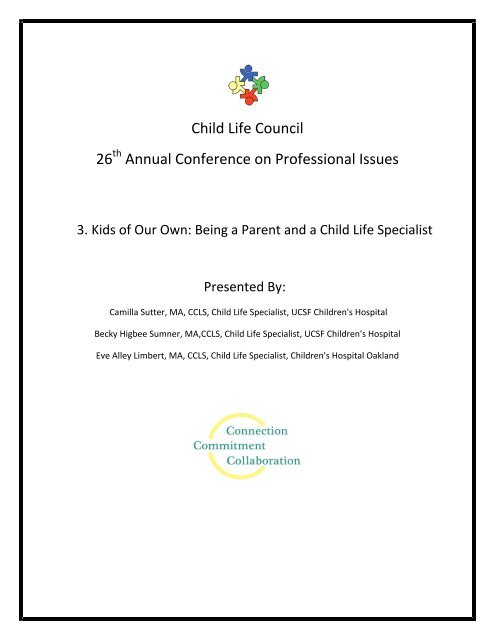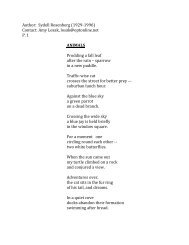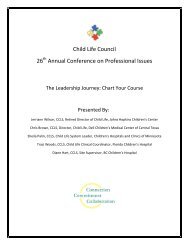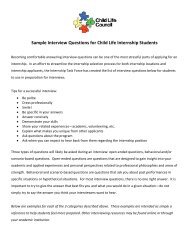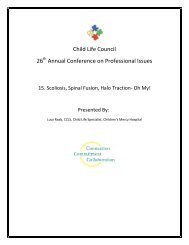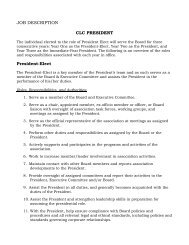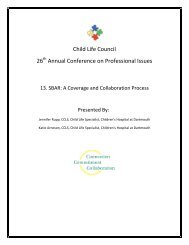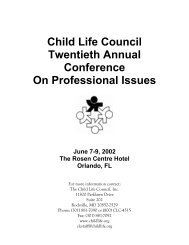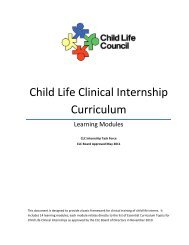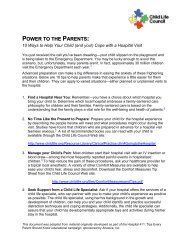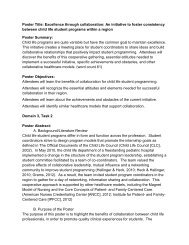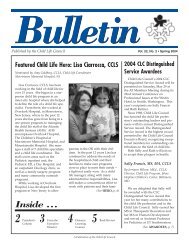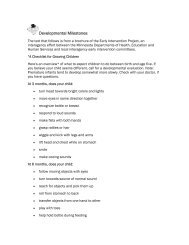Being a Parent and a Child Life Specialist - Child Life Council
Being a Parent and a Child Life Specialist - Child Life Council
Being a Parent and a Child Life Specialist - Child Life Council
Create successful ePaper yourself
Turn your PDF publications into a flip-book with our unique Google optimized e-Paper software.
<strong>Child</strong> <strong>Life</strong> <strong>Council</strong><br />
26 th Annual Conference on Professional Issues<br />
3. Kids of Our Own: <strong>Being</strong> a <strong>Parent</strong> <strong>and</strong> a <strong>Child</strong> <strong>Life</strong> <strong>Specialist</strong><br />
Presented By:<br />
Camilla Sutter, MA, CCLS, <strong>Child</strong> <strong>Life</strong> <strong>Specialist</strong>, UCSF <strong>Child</strong>ren's Hospital<br />
Becky Higbee Sumner, MA,CCLS, <strong>Child</strong> <strong>Life</strong> <strong>Specialist</strong>, UCSF <strong>Child</strong>ren's Hospital<br />
Eve Alley Limbert, MA, CCLS, <strong>Child</strong> <strong>Life</strong> <strong>Specialist</strong>, <strong>Child</strong>ren's Hospital Oakl<strong>and</strong>
Perspective<br />
<strong>Life</strong> as a Balance Beam:<br />
Practical Ideas for Balancing Work <strong>and</strong> Home<br />
Michelle B. Riba, M.D., Alissa Riba, Esq., Erica Riba<br />
I<br />
recently attended a physician leadership conference<br />
where the messages were dominated by sLlch themes as<br />
"have fun," "stop <strong>and</strong> smell the roses," "get regular exercise<br />
<strong>and</strong> eat healthy," "stay focused," <strong>and</strong> "collaborate <strong>and</strong><br />
get out of your silo." We were asked to turn off our cell<br />
phones <strong>and</strong> pagers, so at every break there was a mad dash<br />
for the phone. For half the day, I was worried about how<br />
many e-mails, patient call backups, <strong>and</strong> refills I would be<br />
facing at the end. For the other half, I was thinking about<br />
how I could pick up dinner that would not be grossly unhealthy,<br />
whether I missed a deadline on a letter a colleague<br />
needed for promotion, <strong>and</strong> if my daughter drove home<br />
safely from school.<br />
Does any of this sound familiar? It seems that many of<br />
us are multitasking <strong>and</strong> not exactly feeling focused, balanced,<br />
refreshed, or in control. For years, a colleague <strong>and</strong><br />
I have organized a workshop at the American Psychiatric<br />
Association's annual meeting on "<strong>Child</strong>ren of Psychiatrists"<br />
because we found ourselves wondering about the<br />
potential damage that we were doing to our children because<br />
of our careers in academic psychiatry. At the workshop,<br />
we are continually amazed by the honesty <strong>and</strong> forthrightness<br />
of our speakers <strong>and</strong> attendees in reflecting on<br />
how to balance the range of relationships, duties, <strong>and</strong> responsibilities<br />
we all regularly encounter.<br />
Though I believe the presenters at the leadcrship conference<br />
were genuine in their admonitions <strong>and</strong> their goals<br />
were laudable, how do we manage <strong>and</strong> balance our own<br />
various roles <strong>and</strong> responsibilities? How do we provide excellent<br />
patient care, manage to stay up-to-date with our<br />
journals <strong>and</strong> readings, stay on track for promotion, <strong>and</strong><br />
continue to learn <strong>and</strong> grow after we reach our mid- or late<br />
careers, while exercising <strong>and</strong> eating healthy <strong>and</strong> not burning<br />
Received March 22, 2006; revised May 8,2006; accepted June 5, 2006.<br />
Dr. Riba is affiliated with the Department of Psychiatry, University<br />
of Michigan, Ann Arbor, Michigan. Address correspondence to<br />
Dr. Riba, F6236 MCHC/Box 0295, Ann Arbor, MI 48109; mriba@<br />
umich.edu (e-mail).<br />
Copyright © 2007 Academic Psychiatry<br />
out? How do we nourish our relationships <strong>and</strong> help our<br />
children develop <strong>and</strong> mature into happy <strong>and</strong> strong individuals<br />
while also traveling, attending committee <strong>and</strong> dinner<br />
meetings, <strong>and</strong> writing grants? The list of questions is long,<br />
<strong>and</strong> I frankly do not know the answers. Like many things in<br />
life, when I get stuck, I ask my two daughters, Alissa, 29,<br />
<strong>and</strong> Erica, 17, who kindly provided some comments <strong>and</strong><br />
perspectives on the idea of balance (Appendix 1).<br />
Balancing work, family, <strong>and</strong> personal life takes a lot of<br />
effort-it is not easy. It is a very personal subject, but all<br />
of us are seeking the same things-to try to find a way to<br />
juggle the multiple dem<strong>and</strong>s placed on us while at the same<br />
time enjoying life, not getting burned out, <strong>and</strong> doing a<br />
good job. Making the problem even mon: complex, we all<br />
go through different stages in life. Even if we are "balanced"<br />
during one phase, we might not remain so for the<br />
next. A nanny or babysitter we had for 1 year (or 1 month)<br />
decides to go back to school or calls in sick, <strong>and</strong> this sets<br />
us in a tailspin. Since we all have different families <strong>and</strong><br />
different levels of responsibilities at work <strong>and</strong> at home, it<br />
is impossible to generalize. I do think, though, that there<br />
are ways to learn from one another, so I will offer some<br />
suggestions that may be helpful <strong>and</strong> things that have<br />
worked for me over the years.<br />
Practical Ideas<br />
1. Make friends with different jobs. It is very important<br />
to have friends who can serve as a backup for child<br />
care if needed. Just before school starts in September,<br />
school emergency contact cards arrive in the<br />
school packet, <strong>and</strong> parents have to name at least two<br />
adults, other than a spouse or significant other, who<br />
can be counted on to pick up the children in an emergency.<br />
It is a good idea to cultivate friends who have<br />
different types ofjobs/schedules, so that you can complement<br />
one another.<br />
2. Join professional organizations. Doing so affords potential<br />
ways to meet colleagues who can help advance<br />
Academic Psychiatry, 31 :2, March-April 2007 http://ap.psychiatryonline.org 135
PRACTICAL IDEAS FOR BALANCING WORK AND HOME<br />
your career, pTOvide friendship, <strong>and</strong> collaborate with<br />
you to submit abstracts <strong>and</strong> posters <strong>and</strong> present at<br />
meetings. For example, the Association for Academic<br />
Psychiatry (AAP) is a wonderful organization where<br />
it is easy to get to know colleagues from thTOughout<br />
the United States <strong>and</strong> Canada; be involved in task<br />
forces, projects, <strong>and</strong> presentations at tlle yearly national<br />
meeting; <strong>and</strong> make friends. It is also very<br />
family-friendly, so my children often accompanied<br />
me over the years to the meetings.<br />
3. "I cain't say no." Do not say yes to every professional<br />
offer that comes your way-whether it be for work,<br />
writing, or committees. We all like compliments <strong>and</strong><br />
it is very flattering to be asked. There are not enough<br />
hours in the day, so if you say yes to one thing, you<br />
are really saying no to another. All of us worry that<br />
if we say no to an offer to review an article or join a<br />
committee, we will never be asked again. Though this<br />
may be true occasionally, if you give a reason for why<br />
you need to decline <strong>and</strong> say you would try to make<br />
yourself available next time, most people will be underst<strong>and</strong>ing<br />
<strong>and</strong> will ask again. One of my friends<br />
tells me to call her every time I am about to say yes<br />
to any writing project, since this is my big nemesis. A<br />
chapter, which really offers little academic value to<br />
the curriculum vitae, can take weeks of my life <strong>and</strong><br />
has made many a summer very miserable.<br />
4. Find a mentor. If you are trying to move up the academic<br />
ladder, find a mentor-whether at your own<br />
university or elsewhere-to whom you can send your<br />
curriculum vitae <strong>and</strong> get feedback regarding holes<br />
that need to be filled. For example, it might feel as<br />
though you are working very hard at presentations<br />
<strong>and</strong> talks, but there are a lot of openings in your curriculum<br />
vitae under the peer-reviewed column.<br />
5. Limit work in ofT-work hours. Minimize the evening<br />
dinner/recruitment meetings, early breakfasts, receptions,<br />
<strong>and</strong> time away from the family. There are so<br />
many pulls on us to give more <strong>and</strong> more of our time,<br />
which is not reimbursable <strong>and</strong> does not really show<br />
up on the balance sheet. We all have to do some of<br />
this to be good academic citizens, but sometimes it<br />
can be a real imposition. Think about how often you<br />
want to do something in the evening for work <strong>and</strong><br />
whether some of this activity can be limited. Sometimes<br />
hosting a dinner at your home (catered, of<br />
course) instead of at a restaurant might be just as<br />
easy, <strong>and</strong> you can include your family in the fun.<br />
6. Reward good work. It is good to ask colleagues out<br />
to lunch or for a drink, to acknowledge excellent staff<br />
with gift certificates, or to send e-mails for jobs well<br />
done (with copies to higher level folks). Showing appreciation<br />
makes you feel better <strong>and</strong> helps others<br />
perform at their best.<br />
7. Exercise. It is a key element to keep us healthy, relieving<br />
stress <strong>and</strong> setting an example for children. It<br />
is also important for psychiatrists to help our patients<br />
with modifiable health risk factors, so underst<strong>and</strong>ing<br />
how hard it is to regularize exercise is good for underst<strong>and</strong>ing<br />
patient adherence <strong>and</strong> behaviors.<br />
8. Find what works for you. I rarely went out on Saturday<br />
nights when my children were young. I felt that as<br />
a working mom I should not be away from them if I<br />
did not absolutely need to. I also did not want to have<br />
to worry about organizing any more babysitting than<br />
required. In retrospect, this approach worked. I enjoyed<br />
the weekends with my children <strong>and</strong> my husb<strong>and</strong>,<br />
who is a busy cardiologist. Other friends have felt that<br />
it is important to go 011 dates with their significant<br />
others, <strong>and</strong> I think this should definitely be ronsidered.<br />
You have to figure out what works for you <strong>and</strong> your<br />
family. I do think that balance docs nol naturally<br />
emerge-you have to think about it <strong>and</strong> make it work.<br />
9. Don't be afraid of technology. I attended a business<br />
school function where all of us received mini iPods.<br />
Most of us did not know how to use them-we were<br />
advised to ask our children. I have to say that it has<br />
been one of the most delightful experiences-having<br />
my own music <strong>and</strong> being able to listen to it wherever<br />
I go. I think a lot ofus are technophobic (or less adroit<br />
than we would like to admit) <strong>and</strong> are afraid that new<br />
gadgets will make life even more frustrating. Some of<br />
these devices are actually a lot offun <strong>and</strong> worth tryi ng,<br />
especially if you try to make them playful.<br />
10. Do what you can-within reason. I regret missing<br />
some of my girls' dance recitals, plays, <strong>and</strong> sporting<br />
events. I have done some wild plane trips just to get<br />
back for a few hours to see as many events as I could,<br />
but I was not always able to do so. I think that families<br />
do well when everyone tries very hard <strong>and</strong> everyone<br />
realizes no one is perfect. It is impossible to do all<br />
that we do for patients, for ourselves, for our families,<br />
for our friends, so we just have to keep at it.<br />
11. Eat well with less mess? One of the tasks I have not<br />
yet mastered is how to get good, healthy meals on the<br />
dinner table with minimal cleanup <strong>and</strong> fuss while<br />
avoiding fast food, yet making everyone feel satisfied.<br />
Everyone in my family likes different things, so dinners<br />
136 http://ap.psychiatryonline.org<br />
Academic Psychiauy, 31:2, March-April 2007
RIBA ET AL.<br />
can be quite chaotic <strong>and</strong> messy. I know that some people<br />
swear by crockpul~, freezers, or prepared foods.<br />
Maybe we should do a workshop at our next professional<br />
meeting on ways to succeed at dinner?<br />
In sum, I appreciate the great honor <strong>and</strong> privilege to<br />
share some of our family's ways (<strong>and</strong> lack thereof) of "balancing."<br />
This list is always changing, so maybe there will<br />
be new ones next time!<br />
APPEN DIX 1. Daughters' Perspectives<br />
Alissa Riba (age 29)<br />
I don't know how my mom manages. On a daily basis she seems to make everything run smoothly. I think there's a lot ofthings that go into the mix of<br />
making it work-it's those long lists she leaves with the things that need to get done <strong>and</strong> the numbers to call when they don't; it's the constant reminders<br />
<strong>and</strong> daily check·ins ofmy normal day <strong>and</strong> it's depnitely her perspective on people <strong>and</strong> the things that really matter in life.<br />
When I was in college, I remember receiving a poor grade on a paper. My mom's response was something like, "Well, a lot worse could have happened<br />
today. It's just a grade, <strong>and</strong> in the gr<strong>and</strong> scheme ofthings, it is not a big deal. Go have a good rest ofyour day <strong>and</strong> don't get yourselftoo worked up over<br />
it." To be honest, that's not the response you want when you're feeling sorry for yourself You want someone to commiserate with you <strong>and</strong> feel sorry for<br />
you too.<br />
Later on that day, when I was feeling better <strong>and</strong> asked her how her day was going, she told me that on that day she had just seen a patient who had<br />
metastatic cancer with a poor prognosis. The patient also had a small child who at the time was waiting in the sitting room while my mom was with the<br />
patient. Just the idea ofthat had an effed on me. I have no idea what my grade on the paper was or even what the paper was about. I do remember<br />
that story ofthe patient <strong>and</strong> thinking that my mother was right <strong>and</strong> that the day for me could have been a lot worse.<br />
My mom has patients all the time as well as colleagues who depend on her. She has meetings <strong>and</strong> trips, <strong>and</strong> she even has a social life. Even with all of<br />
these working.mom responsibilities, she makes me feel like I'm a priority.<br />
I think that working moms in general have a lot ofresponsibilities, <strong>and</strong> at times it seems impossible to pnd balance-but it's the little things, the words<br />
ofcomfort <strong>and</strong> advice <strong>and</strong> the acknowledgement that she will always be there. She supports me regardless ofwhat that particular day might bring.<br />
Erica Riba (age 17)<br />
Balancing work <strong>and</strong> family is hard. My mom is a pro at it. I often get asked what it's like being a daughter ofa psychiatrist. I say, without hesitation,<br />
"It's great!" Every afternoon when I get home, my mom calls me with so many questions. I sometimes think it's too much, but at the end ofthe day, I<br />
really underst<strong>and</strong> why she does it. Sure, she tries to pgure out by my tone ofvoice what is wrong. When she gets home, one awkward facial expression<br />
pops up <strong>and</strong> she tries to pgure out what I have been trying to keep {rom her. But it is so great to know someone cares aboutyour feelings or what went<br />
on during your day.<br />
My mom can be swamped all day with patients, meetings, lectures, <strong>and</strong> conference calls, but when she gets home, it is family time (until the conference<br />
calls start again in the evening!). She seems to always have everything under control, <strong>and</strong> that's what balance means to me.<br />
I will never forget in 1O'h grade when I felt really sick during school. I knew I had to go home. I called my mom <strong>and</strong> she immediately dropped everything<br />
she was doing to pick me up <strong>and</strong> bring me home. I always had a babysitter <strong>and</strong> my mom traveled a lot, so this was tough. I knew, though, that even with<br />
all that hard work she was doing, she still thought about me <strong>and</strong> made sure everything was alright for me. I knew that in an emergency, she would be<br />
there for me. I actually always felt it was a privilege <strong>and</strong> fun to be the daughter ofa psychiatrist.<br />
Academic Psychiatry, 31 :2, March-April 2007 http://ap.psychiatryonline.org 137
Kids of Our Own:<br />
<strong>Being</strong> a <strong>Parent</strong> <strong>and</strong> a <strong>Child</strong> <strong>Life</strong> <strong>Specialist</strong><br />
Becky Higbee Sumner, M.A., CCLS<br />
Camilla Sutter, M.A., CCLS<br />
<strong>Child</strong> <strong>Life</strong> <strong>Specialist</strong>s<br />
UCSF <strong>Child</strong>ren’s Hospital<br />
San Francisco, CA<br />
(415) 353-1203<br />
becky.Higbee@ucsfmedctr.org<br />
camilla.sutter@ucsfmedctr.org<br />
Eve Alley Limbert, M.A., CCLS<br />
<strong>Child</strong>ren’s Hospital Oakl<strong>and</strong><br />
<strong>Child</strong> <strong>Life</strong> <strong>Specialist</strong><br />
Oakl<strong>and</strong>, CA<br />
evealley@yahoo.com<br />
BOOKS:<br />
Humor:<br />
Help Me Before I Go Crazy: Adventures from a Working Mother's <strong>Life</strong><br />
Marjorie Nightingale<br />
Charlotte's Books, Baltimore, Maryl<strong>and</strong> Feb, 2004<br />
Resources:<br />
The Working Mother's Guide to <strong>Life</strong>: Strategies, Secrets <strong>and</strong> Solutions<br />
Linda Mason<br />
Three Rivers Press, NY 2002<br />
*Includes a section on cultural difference of the idea of a "working"<br />
mother<br />
The Working <strong>Parent</strong>s H<strong>and</strong>book<br />
June Solnit Sale, Kit Kollenberg, Ellen Melinkoff<br />
Fireside Press, NY 1996<br />
Articles from UCLA Working <strong>Parent</strong>s newsletter, a realistic, detailed<br />
guide for parents who balance work <strong>and</strong> child rearing<br />
Mommy Wars: Stay-at-Home <strong>and</strong> Career Moms Face Off on Their<br />
Choices, Their Lives, Their Families<br />
Leslie Morgan Steiner<br />
R<strong>and</strong>om House, NY 2007<br />
26 stay-at-home <strong>and</strong> career moms face off on their choices, their lives,<br />
<strong>and</strong> their families.<br />
Nursing Mother, Working Mother: The Essential Guide for Breastfeeding<br />
<strong>and</strong> Staying Close to Your Baby After You Return to Work<br />
Gale Pryor<br />
Harvard Common Press, 1996<br />
The Birth of a Mother: How the Motherhood experience changes you<br />
forever<br />
Daniel N. Stern<br />
Basic Books, 1998
The Hidden Feelings of Motherhood<br />
Kathleen Kendall-Tackett, PH.D.<br />
Pharmasoft Publishing, 2005<br />
Mothering the New Mother: Women's Feelings <strong>and</strong> Needs after<br />
<strong>Child</strong>birth<br />
Sally Placksin<br />
Newmarket Press, 1994<br />
Misconceptions: Truth, Lies <strong>and</strong> the Unexpected on the Journey to<br />
Motherhood<br />
Naomi Wolf<br />
Anchor, 2003<br />
The Mask of Motherhood: How Becoming a Mother Changes Our Lives <strong>and</strong><br />
why we never Talk about it<br />
Susan Maushart<br />
Penguin, 2000<br />
ARTICLES:<br />
WEBSITES:<br />
Short-Term <strong>and</strong> Long-Term Effects of Early <strong>Parent</strong>al Employment<br />
Elizabeth Harvey, Ph.D., University of Mass., Amherst<br />
Developmental Psychology, Vol. 35, No. 2<br />
www.mommytrackd.com<br />
www.manicmommies.com<br />
www.parenthacks.com<br />
www.momsrefuge.com


